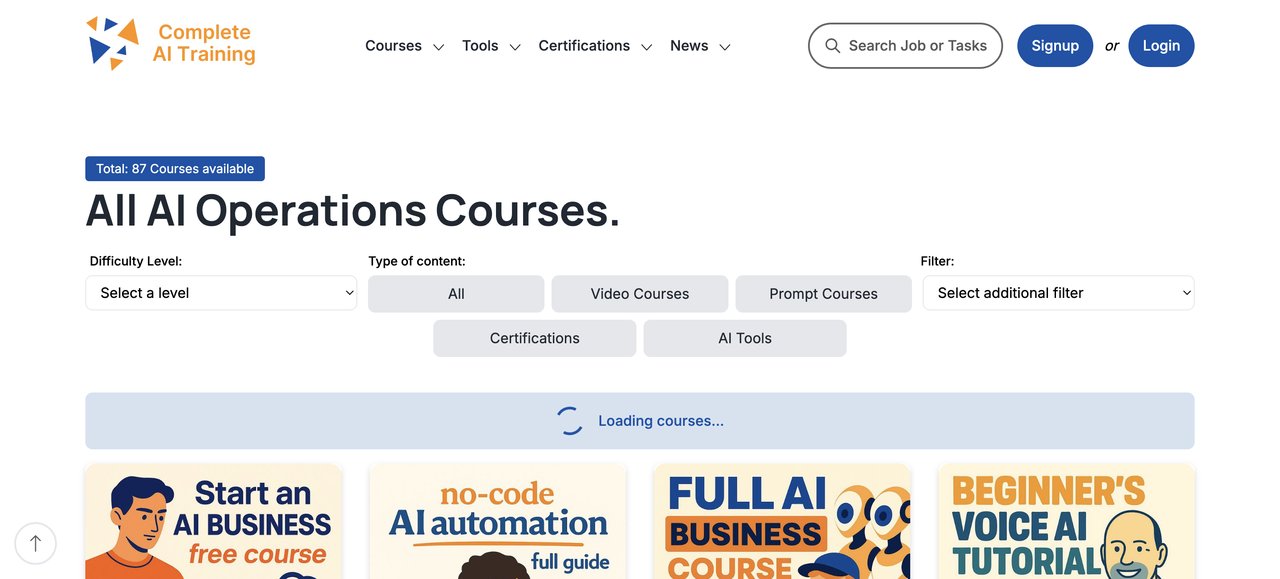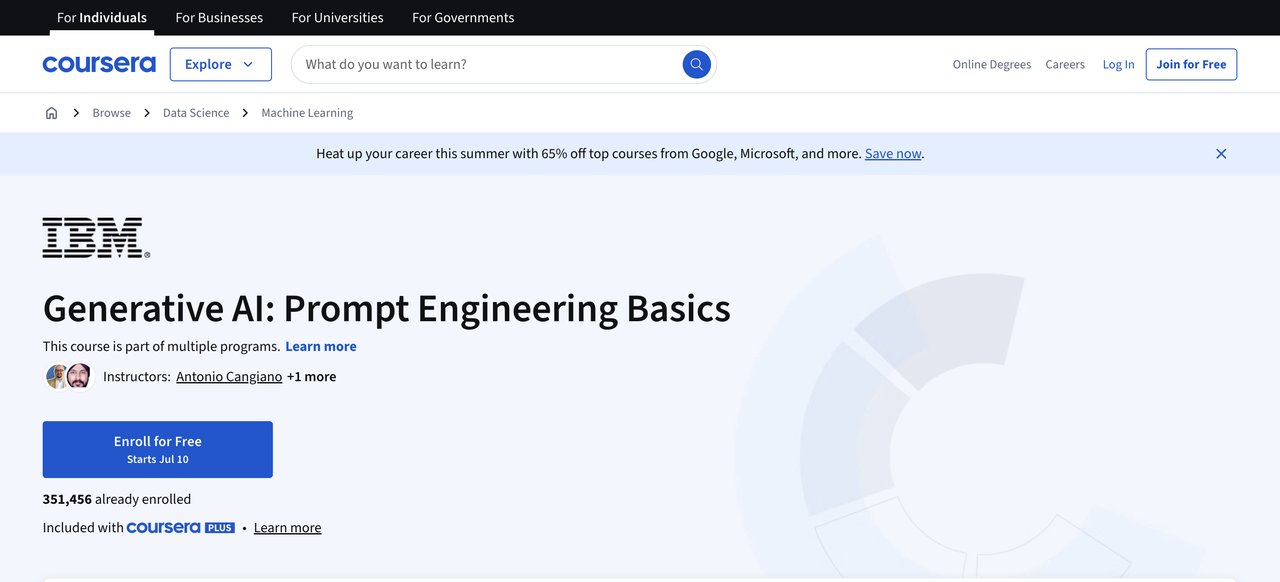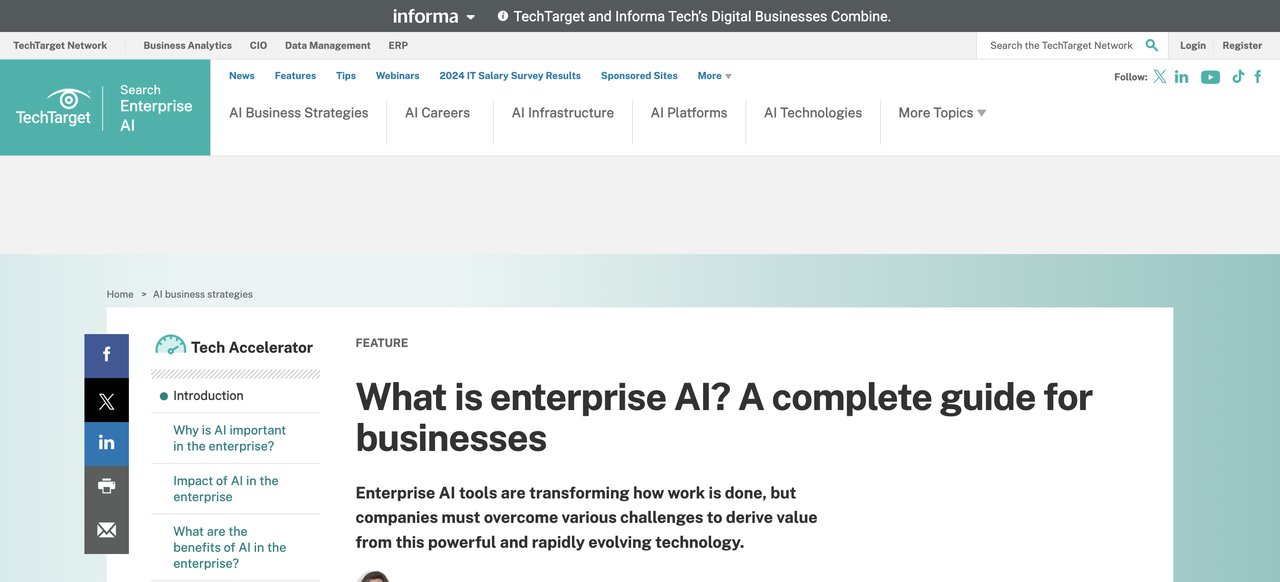12 Recommended AI Courses for People in the Operations Field in 2025
Discover top AI courses tailored for operations professionals in 2025. Enhance your skills with cutting-edge insights, tools, and strategies to stay ahead in the ever-evolving tech landscape. Unlock your potential and optimize your operations expertise today!

As artificial intelligence continues to grow at an unprecedented pace, its influence is becoming increasingly significant across various sectors, including operations. For professionals in the operations field, the importance of upskilling with AI knowledge cannot be overstated. The integration of AI into operations processes is not just a trend but a necessity, as it holds the potential to enhance efficiency, drive innovation, and ultimately impact job roles and responsibilities. This article aims to guide operations professionals in identifying the most suitable AI courses, enabling them to stay competitive and relevant in their careers.
Why AI matters for People in the Operations Field today
The integration of AI in operations is critical today more than ever. With approximately 69% of businesses adopting AI in some form, understanding and leveraging AI technologies is crucial for operations professionals. AI's ability to process large volumes of data and generate actionable insights makes it an indispensable tool for optimizing operations. This article is designed to assist operations professionals in selecting the best AI courses that align with their career goals and industry needs.
The Growing Role of AI in People in the Operations Field
AI applications are becoming increasingly prevalent in the operations field. From automating routine tasks to enhancing decision-making processes and personalizing customer experiences, AI is transforming the way operations are conducted. Automation allows for the streamlining of processes, reducing time and resource expenditure. AI-driven decision-making tools provide real-time insights, enabling more informed and strategic choices. Personalization, powered by AI, enhances customer interaction and satisfaction. These advancements illustrate how AI is reshaping tasks and workflows within the operations domain, making it imperative for professionals to adapt and learn.
Benefits of becoming an AI expert in People in the Operations Field
For operations professionals, acquiring expertise in AI offers numerous advantages. It enhances career prospects by opening up opportunities for advancement and specialization. AI skills enable professionals to contribute more effectively to their organizations by improving operational efficiencies and driving innovation. Moreover, an in-depth understanding of AI tools and techniques allows professionals to anticipate and respond to industry changes proactively. By becoming proficient in AI, operations professionals can position themselves as valuable assets within their organizations, capable of leading and managing AI-driven initiatives.
This article provides a comprehensive comparison of 12 AI courses tailored for operations professionals, including the highly regarded CompleteAI Training. By exploring these educational opportunities, operations professionals can make informed decisions about their learning paths and gain the necessary skills to excel in an AI-driven world.

Comparison: All AI Courses for People in the Operations Field (Updated Q2' 2025)
| Course Name | Provider | Price | Key Topics | Pros | Cons | Best For |
|---|---|---|---|---|---|---|
| AI for People in the Operations Field | CompleteAI Training | $29/month or $8.25/month billed annually | Video courses, certifications, AI tools, industry news | Highest rating, extensive range, daily updates, affordable pricing | Subscription based | People in the Operations Field professionals |
| AI For Business | University of Pennsylvania | $39-$79/month | Operational efficiency, business strategy, data governance | Focuses on operational efficiency, suitable for beginners | Requires 3-6 months, may require business familiarity | General learners |
| Google AI Essentials | $39-$79/month | Prompt engineering, generative AI, process optimization | Emphasizes operational efficiency, beginner-friendly | Requires 1-3 months, more technical | General learners | |
| IBM AI Foundations for Everyone | IBM | $39-$79/month | Workflow management, business process automation | Focus on automation, beginner-friendly | Requires 3-6 months, conceptual focus | General learners |
| IBM AI Product Manager | IBM | $39-$79/month | Product management, stakeholder engagement | Practical for managers, high learner rating | Requires 3-6 months, focused on product management | General learners |
| IBM Generative AI: Prompt Engineering Basics | IBM | Free trial, under $50 | Prompt engineering, generative AI tools | Short duration, practical skills | Limited depth, focused on prompt engineering | General learners |
| Introduction to Artificial Intelligence (AI) | IBM | Free trial, under $50 | AI fundamentals, business applications | Beginner-friendly, broad coverage | Not specialized for operations | General learners |
| Artificial Intelligence: Business Strategies and Applications | University of California, Berkeley Executive Education and Emeritus | $2,000-$5,000 | AI applications in business, managing AI teams | Focus on business integration, suitable for executives | Not a technical course | General learners |
| IBM Applied AI Professional Certificate | IBM | $39-$79/month | AI basics, machine learning, neural networks | Beginner level, hands-on with IBM Watson | Requires Python knowledge | General learners |
| Master the Fundamentals of AI and Machine Learning | LinkedIn Learning | $29.99/month | AI accountability, project management | Short courses, open to all levels | Subscription required | General learners |
| Artificial Intelligence A-Z 2024: Build 7 AI + LLM & ChatGPT | Udemy | $199 (may vary with discounts) | Machine learning, deep learning, NLP | Extensive projects, state-of-the-art models | Requires programming knowledge | General learners |
| Deep Learning Specialization | Deeplearning.ai | $39-$79/month | Neural networks, deep learning techniques | Taught by Andrew Ng, in-depth coverage | Requires intermediate skills | General learners |
Understanding AI Training for People in the Operations Field Professionals
Artificial Intelligence (AI) is becoming an integral part of business operations across various industries. For professionals in the operations field, acquiring AI skills can enhance efficiency and decision-making processes. This article provides a detailed comparison of AI courses tailored for operations field professionals, offering insights into course content, target audience, and key benefits. This guide will help you identify the most suitable AI training for your career needs.
Course 1: CompleteAI Training

CompleteAI Training offers an extensive library of over 100 video courses and certifications specifically designed for operations professionals. With a focus on AI education, the platform provides daily updates on the latest AI tools and industry news relevant to the operations field. The courses are affordable, with a monthly subscription model that encourages continuous learning.
Key Topics Covered: AI tools and technologies, industry-specific applications, process optimization, and certification in AI for operations.
Target Audience and Skill Level Requirements: Geared towards professionals in the operations field, the courses are suitable for individuals at all experience levels, from beginners to advanced learners.
- Pros:
- Highly rated and comprehensive offering.
- Wide range of courses and certifications tailored for operations professionals.
- Affordable pricing, especially with annual billing.
- Frequent updates on AI tools and news.
- Cons:
- Subscription-based model requires ongoing commitment.
Who Would Benefit Most: Operations professionals seeking a thorough and continuous AI education with a focus on the latest tools and industry updates.
Course 2: AI For Business by University of Pennsylvania

AI For Business is designed to help learners improve business operations through AI. The course covers AI personalization, data ethics, and data-driven decision-making, providing a strategic approach to integrating AI into business operations.
Key Topics Covered: Operational efficiency, data governance, HR tech, machine learning applications, and risk management.
Target Audience and Skill Level Requirements: Suitable for beginners and business professionals looking to integrate AI into operations, requiring some familiarity with business concepts.
- Pros:
- Focuses on operational efficiency and business strategy.
- Covers important ethical and governance considerations.
- Beginner-friendly.
- Cons:
- Requires a 3-6 month commitment.
- Assumes familiarity with basic business concepts.
Who Would Benefit Most: Business professionals interested in using AI to enhance operational efficiency and strategic decision-making.
Course 3: Google AI Essentials by Google

Google AI Essentials introduces foundational AI concepts with a focus on improving productivity and operational workflows. The course covers prompt engineering, generative AI, and digital transformation.
Key Topics Covered: Operational efficiency, process optimization, productivity software, and workforce development.
Target Audience and Skill Level Requirements: Ideal for operations professionals aiming to apply AI in improving workflows, requiring a 1-3 month time commitment.
- Pros:
- Emphasizes operational efficiency and workforce development.
- Practical applications of emerging AI technologies.
- Beginner-friendly.
- Cons:
- Requires time investment.
- More technical focus than strategic.
Who Would Benefit Most: Operations professionals looking to enhance productivity and workflow efficiency through AI technologies.
Course 4: IBM AI Foundations for Everyone by IBM

IBM AI Foundations for Everyone provides a comprehensive overview of AI's role in business process automation and workflow management. The course covers practical AI applications and market opportunities.
Key Topics Covered: Workflow management, machine learning, business process automation, and customer service automation.
Target Audience and Skill Level Requirements: Designed for professionals who want to understand AI’s role in optimizing business operations, requiring a 3-6 month commitment.
- Pros:
- Focus on business process automation and workflow management.
- Includes practical AI applications relevant to operations.
- Beginner-friendly with IBM’s industry perspective.
- Cons:
- More conceptual than deep technical training.
Who Would Benefit Most: Operations professionals seeking to understand and apply AI in business process automation and workflow optimization.
Course 5: IBM AI Product Manager by IBM

IBM AI Product Manager focuses on managing AI-driven projects, covering product lifecycle management and stakeholder engagement. The course is valuable for operations professionals involved in AI product deployment or management.
Key Topics Covered: Product lifecycle management, innovation, stakeholder engagement, and commercialization.
Target Audience and Skill Level Requirements: Ideal for operations managers overseeing AI initiatives, requiring a 3-6 month commitment.
- Pros:
- Covers AI product lifecycle and stakeholder management.
- Practical for operations managers overseeing AI initiatives.
- High learner rating and industry recognition.
- Cons:
- More focused on product management than core AI technology.
Who Would Benefit Most: Operations managers responsible for deploying and managing AI products and initiatives.
Course 6: IBM Generative AI: Prompt Engineering Basics by IBM

IBM Generative AI: Prompt Engineering Basics is a short course introducing prompt engineering and ChatGPT. It is useful for operations professionals interested in leveraging generative AI tools to enhance workflows.
Key Topics Covered: Prompt engineering, ChatGPT, large language models, and IBM Cloud.
Target Audience and Skill Level Requirements: Designed for beginners, this course can be completed in 1-4 weeks.
- Pros:
- Short duration with practical skills.
- High learner ratings.
- Focused on leveraging generative AI in operations.
- Cons:
- Limited depth on broader AI concepts.
Who Would Benefit Most: Operations professionals seeking to enhance operational workflows using generative AI tools.
Course 7: Introduction to Artificial Intelligence (AI) by IBM

Introduction to Artificial Intelligence (AI) covers fundamental AI concepts, including natural language processing and market opportunities. It provides a broad introduction to AI technologies for operations professionals.
Key Topics Covered: Generative AI, ChatGPT, natural language processing, and business applications.
Target Audience and Skill Level Requirements: Suitable for beginners, this course is designed to be completed in 1-4 weeks.
- Pros:
- Beginner-friendly and concise.
- Covers AI basics with business context.
- High learner ratings.
- Cons:
- Not specialized for operations but broadly applicable.
Who Would Benefit Most: Operations professionals seeking a broad understanding of AI technologies and their business applications.
Course 8: Artificial Intelligence: Business Strategies and Applications by University of California, Berkeley Executive Education and Emeritus

Artificial Intelligence: Business Strategies and Applications is tailored for senior leaders and managers aiming to integrate AI into organizations. The course covers AI applications, managing AI teams, and project integration.
Key Topics Covered: AI capabilities, automation, machine learning, deep learning, and managing AI projects.
Target Audience and Skill Level Requirements: Designed for managers and executives, this program is suitable for those interested in business integration of AI.
- Pros:
- Focus on business integration of AI.
- Suitable for managers and executives.
- Covers managing AI teams and projects.
- Cons:
- Not a technical development course.
Who Would Benefit Most: Senior leaders and managers seeking to integrate AI into business operations and manage AI projects effectively.
Course 9: IBM Applied AI Professional Certificate by IBM

IBM Applied AI Professional Certificate is a beginner-friendly certification introducing AI basics and applications. It emphasizes practical skills such as building AI-powered tools using IBM Watson services and Python.
Key Topics Covered: Machine learning, neural networks, AI-powered tools, and virtual assistants.
Target Audience and Skill Level Requirements: Suitable for non-technical backgrounds, though final courses require some Python knowledge.
- Pros:
- Beginner level, accessible to non-technical backgrounds.
- Hands-on with IBM Watson AI tools.
- Includes chatbot and computer vision applications.
- Cons:
- Final courses require some Python knowledge.
Who Would Benefit Most: Individuals interested in practical AI applications and building AI-powered tools.
Course 10: Master the Fundamentals of AI and Machine Learning by LinkedIn Learning

Master the Fundamentals of AI and Machine Learning is a series of 10 short courses covering foundational AI and machine learning concepts. The courses are suitable for operations professionals seeking to understand AI’s impact on business processes.
Key Topics Covered: AI accountability, neural networks, AI algorithms, and AI for project managers.
Target Audience and Skill Level Requirements: Open to all experience levels, requiring a subscription for access.
- Pros:
- Short, manageable courses.
- Covers AI accountability and project management.
- Open to all experience levels.
- Cons:
- Subscription required.
Who Would Benefit Most: Operations professionals interested in managing AI projects and understanding AI's impact on business processes.
Course 11: Artificial Intelligence A-Z 2024: Build 7 AI + LLM & ChatGPT by Udemy

Artificial Intelligence A-Z 2024 provides comprehensive coverage of AI concepts, including machine learning, deep learning, and natural language processing. The course includes practical projects such as AI chatbots and process optimization.
Key Topics Covered: Machine learning, deep learning, large language models, and AI chatbots.
Target Audience and Skill Level Requirements: Suitable for learners with basic Python and math knowledge.
- Pros:
- Extensive practical projects.
- Covers advanced AI models and techniques.
- Suitable for learners with some programming knowledge.
- Cons:
- Requires programming knowledge.
- Price may be high without discounts.
Who Would Benefit Most: Learners with basic Python skills interested in practical AI projects and advanced AI concepts.
Course 12: Deep Learning Specialization by Deeplearning.ai (on Coursera)

Deep Learning Specialization is an intermediate to advanced series focusing on neural networks and deep learning techniques. It is ideal for operations professionals who wish to deepen their technical understanding of AI models.
Key Topics Covered: Neural networks, convolutional and recurrent neural networks, and natural language processing.
Target Audience and Skill Level Requirements: Requires intermediate Python and math skills, suitable for those looking to apply AI to complex operational challenges.
- Pros:
- Taught by renowned AI expert Andrew Ng.
- In-depth coverage of deep learning techniques.
- Cons:
- Requires intermediate Python and math skills.
- More technical than business-focused courses.
Who Would Benefit Most: Operations professionals seeking in-depth technical training in deep learning for complex operational applications.
Overall Recommendations
When choosing an AI course for operations field professionals, consider your current skills, career goals, and the time you can commit. For those seeking a comprehensive and continuous learning experience, CompleteAI Training offers a robust library of courses and daily updates, making it ideal for those dedicated to staying updated with the latest AI developments. For a strategic approach to business operations, the AI For Business by University of Pennsylvania is suitable for professionals interested in integrating AI into business strategies. If you are looking for practical applications and foundational skills, Google AI Essentials and IBM Generative AI: Prompt Engineering Basics provide hands-on experience. Ultimately, selecting the right course depends on your specific needs, whether it's technical depth, business integration, or continuous learning in AI.




